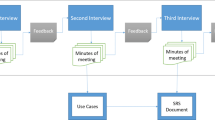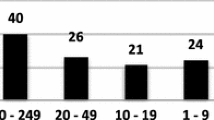Abstract
When learning a new software engineering technique, there is a learning curve that must be overcome. In particular, when studies are conducted in a classroom setting, researchers need a method for quickly accelerating the experience of novice subjects to allow the results to be more applicable in industrial settings. In this paper, we propose and test a method to enable novices to gain process experience to allow them to more quickly overcome the learning curve. The method we evaluate allows an inspector to gain experience with the inspection process by observing an inspection performed by someone else. The results of the study show that the proposed method for gaining experience appears to be useful in some limited cases, that is, for low experienced subjects who were inspecting a requirements document from a domain in which they had low knowledge. Based on the results of this study, we are able to propose some new related hypotheses to be tested in future studies.



Similar content being viewed by others
References
Arif T, Hegde LC (2001) Inspection of Object Oriented Construction: A Study of Reading Techniques Tailored for Inspection of Design Models Expressed in Uml. Prediploma Thesis. Norwegian University of Science and Technology
Basili V, Green S, Laitenberger O, Shull F, Sorumgaard S, Zelkowitz M (1996) The empirical investigation of perspective based reading. Empirical Software Engineering—An International Journal 1:133–164
Basili V, Selby R (1987) Comparing the Effectiveness of Software Testing Strategies. IEEE Trans Softw Eng 13:1278–1296
Bisant DB, Lyle JR (1989) A two-person inspection method to improve programming productivity. IEEE Trans Softw Eng 15:1294–1304
Campbell D, Stanley J (1963) Experimental and quasi-experimental designs for research. Houghton Mifflin, Boston
Carver J (2003a) The Impact of Background and Experience on Software Inspections. PhD Thesis. Department of Computer Science, University of Maryland
Carver J, Jaccheri L, Morasca S, Shull F (2003b) Issues in Using Students in Empirical Studies in Software Engineering Education. Proceedings of Ninth International Software Metrics Symposium (METRICS 2003), pp239–249
Carver J, Shull F, Basili V (2003c) Observational Studies to Accelerate Process Experience in Classroom Studies: An Evaluation. Proceedings of International Symposium on Empirical Software Engineering, ISESE 2003, pp72–79
Collins A, Brown JS, Newman SE (1989) Cognitive apprenticeship: Teaching the crafts of reading, writing and mathematics. In: Resnik LB (ed) Knowing, learning, and instruction: Essays in honor of Robert Glaser. Lawrence Erlbaum, Hillsdale, NJ
Conradi R, Mahagheghi P, Arif T, Hegde LC, Bunde GA, Pedersen A (2003) Object-Oriented Reading Techniques for Inspection of Uml Models—An Industrial Experiment. Proceedings of European Conference on Object-Oriented Programming (ECOOP’03) Darmstadt, Germany, 483–500
Kamsties E, Lott C (1995) An Empirical Evaluation of Three Defect-Detection Techniques. ISERN Technical Reports. ISERN-95-02
Knight JC, Myers EA (1993) An improved inspection technique. Commun ACM 36:51–61
Laitenberger O, DeBaud J-M (2000) An encompassing life cycle centric survey of software inspection. J Syst Softw 50:5–31
Melo W, Shull F, Travassos G (2001) Software Review Guidelines. COPPE Technical Reports. ES-556/01
Muller MM, Tichy WF (2001) Case Study: Extreme Programming in a University Environment. Proceedings of 23rd International Conference on Software Engineering, ICSE 2001, 537–544
Münch J, Armbrust O (2003) Using Empirical Knowledge from Replicated Experiments for Software Process Simulation: A Practical Example. Proceedings of Empirical Software Engineering, 2003. ISESE 2003. Proceedings. 2003 International Symposium on, 18–27
Pintrich PR, Schunk D (1996) Chapter 5: Other social cognitive processes. Motivation in education: Theory, research and practice. Prentice Hall, Englewood Cliffs
Porter A, Votta L (1998) Comparing detection methods for software requirements inspections: A replication using professional subjects. Empirical Software Engineering — An International Journal. 3:355–379
Shull F (1998) Developing Techniques for Using Software Documents: A Series of Empirical Studies. PhD Thesis. Department of Computer Science, University of Maryland, College Park
Shull F, Rus I, Basili V (2000) How perspective-based reading can improve requirements inspections. Computer 33:73–79
Shull F, Carver J, Travassos G (2001) An Empirical Methodology for Introducing Software Processes. Proceedings of Joint 8th European Software Engineering Conference (ESEC) and 9th ACM SIGSOFT Foundations of Software Engineering (FSE-9). Vienna, Austria, pp288–296
Singer J, Lethbridge T (1996) Methods for Studying Maintenance Activities. Proceedings of Workshop for Empirical Studies of Software Maintenance. Monterey, California, pp105–110
Spinellis D (2001) Fear of coding, and how to reduce it. IEEE Computer 34:100–199
Williams L (2001) Integrating Pair Programming into a Software Development Process. Proceedings of Software Engineering Education and Training, 2001. Proceedings 14th Conference on, pp27–36
Wood M, Roper M, Brooks A, Miller J (1997) Comparing and Combining Software Defect Detection Techniques: A Replicated Empirical Study. Proceedings of 1997 Foundations of Software Engineering, pp262–277
Zhang Z, Basili V, Shneiderman B (1999) Perspective-based usability inspection: An empirical validation of efficacy. Empirical Software Engineering—An International Journal 4:43–70
Acknowledgments
We would like to thank the students of CMSC735 in the Fall Semester of 2001 at the University of Maryland for their participation in this study. We thank the anonymous reviewers for their insightful comments. We would also like to thank the reviewers for their helpful and insightful comments. Finally we would like to thank Dr. J. Edward Swan from Mississippi State University for providing aid on the statistical presentation. We acknowledge support from the NSF Reader’s Project (CCR-9900307) and the NSF CeBASE Project (CCR-0088078).
Author information
Authors and Affiliations
Corresponding author
Additional information
Editor: Murray Wood
Rights and permissions
About this article
Cite this article
Carver, J., Shull, F. & Basili, V. Can observational techniques help novices overcome the software inspection learning curve? An empirical investigation. Empir Software Eng 11, 523–539 (2006). https://doi.org/10.1007/s10664-006-9021-5
Published:
Issue Date:
DOI: https://doi.org/10.1007/s10664-006-9021-5




